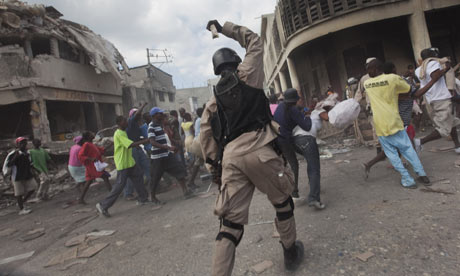
Map of mining resources in Haiti and showing five oil/gas sites in Haiti
***************************************************
Did the mining of Haiti's riches since 2004 GW Bush regime change cause the earthquake? Listen to Ezili Dantò on mining Haiti's riches and concern for environmental degradation by the foreign companies. (Read the transcript with reference links.)
"The idea that human activity can cause seismic activity is widely accepted in the scientific community ...the connection between oil production and earthquakes dates back to at least the 1920s, when geologists in South Texas noted faulting near the Goose Creek oil field...A 1967 human-triggered earthquake in western India linked to the Koyna Dam registered a 7.0 earthquake."
***************************************************
Since the earthquake, I've had occasion to ponder, like many others, about what may have caused this heretofore-unknown natural disaster in Haiti? Was it a natural occurrence or man-made? Port-au-Prince, Haiti has not had an earthquake in 239 years. Why now? The nation of Haiti is only 206 years old, so Haitians in Port-au-Prince have no experience with earthquakes whatsoever. Did not know that for an earthquake you run away from the house. So, when the trembling started they did the worst possible thing - ran into their houses as they are used to, for protection, with hurricanes. The houses all collapsed on them.
The devastation is heartwrenching. 200,000 dead in the capital alone, devastation in the South also, in Leogane, Les Cayes, Jacmel. In Port Au Prince everything collapse, 400,000 to be relocated, millions homeless, untold numbers with amputated limbs, hundreds of thousands right now dying without access to water, food, shelter and medical treatment.
Since the 2004 Bush regime change, Ezili's HLLN has been concerned about the digging up of Haiti without any regards to environmental degradation.
In an April 29, 2009 interview with Chris Scott of CKUT (90.3 FM) in Montreal, entitled Haiti's Riches: Interview with Ezili Dantò on Mining in Haiti, I expressed concerned that under the UN occupation which made the Haitian goverment a puppet government, Haitian lives and welfare were not priorities just corporate exploitation of Haiti's resources and cheap labor. Haiti's emergency civil preparedness agency was destroyed during the Bush regime change and never rebuilt. (See, Earthquake in Haiti: Under Aristide, Haitians were prepared for disaster.) We've had severe hurricanes in 2004, 2005 and then the four back-to-back hurricanes of 2008. The people's living conditions has not improved in the 6-years the U.S., France and Canada have controlled Haiti through the U.N. proxy occupation. In fact, with clorox hunger, food riots, no monie to send children to school, high food and fuel prices, no development, things, had gotten much worse since the coup against President Aristide. The people were simply slowly dying as UN Special Envoy Bill Clinton waxed on about the "good business climate" in Haiti prior to the earthquake. They died and there was no rebuilding of the institutions the Bush coup d'etat had helped destroy. But there were 9,000 UN troops in Haiti doing what?
In the Mining Haiti's Riches interview, I recount how there were areas in Haiti hidden behind UN guns, fenced off where Haitians knew nothing about what these soldiers were doing.
Then the earthquake hit. What remains is unimaginable. The rescue and recovery process was and is inhumane. The relief from pain and hunger is still not in place. And, as I think about the process of rebuilding, I started checking whether digging for gold, iridium, copper, uranium, coal, marble, diamonds, oil and gas could trigger an earthquake. And the answer I found sent chills up my spine. Made me sick to my stomach. Can this really be?
From what I've read, drilling deep into the earth, digging and mining may trigger earthquakes.
And, drilling either for fossil fuels or renewable energy exploration may cause earthquakes. Both geophysicists and oilmen agree that natural-gas drilling trigger earthquakes. One oilman stated that "there is not the slightest doubt" that gas production caused the temblors." (See, At Fault: Does Drilling Cause Earthquakes?).
A New York Times report confirmed drilling for oil sets off earthquakes and detailed how a drilling project near San Francisco and a similar project in Basel, Switzerland were shut down over concerns they triggered damaging earthquakes. Both diggings involved fracturing hard rock more than two miles deep.
...large earthquakes tend to originate at great depths, breaking rock that far down carries more serious risk, seismologists say. Seismologists have long known that human activities can trigger quakes, but they say the science is not developed enough to say for certain what will or will not set off a major temblor. (Geothermal energy and Quake Threat Leads Swiss to Close Geothermal Project.)
***************************************************
Haitians have been under occupation by the US through the proxy UN mission since the 2004 Bush regime change/coup d'etat.
Before the earthquake, Rene Preval, the president of Haiti answered to Washington not the people of Haiti. I've written extensively about this and that information is readily available. The mining in Haiti and the digging up of Haiti was going on without any oversight. (See, Recommended HLLN Links (Energy and Mining in Haiti): The wealthy, powerful and well-armed are robbing the Haitian people blind and, Oil in Haiti - Economic Reasons for the UN/US occupation and Oil in Haiti by Dr. Georges Michel; Fayed's Forgotten Years: The Conman, The Dictator and the CIA Files.)
Since the earthquake hit, it's been clear that the power-brokers who control the US military, the free marketeers, are exploiting this Haiti earthquake shock, when the Haitian people are hurt, in pain, disorientated and horrifically more defenseless than usual, to impose their privatization and further entrench their corporate domination in Haiti. (Haiti Disaster Capitalism Alert: Stop Them Before They Shock Again.)
I know some folks are saying there are sophisticated equipment ( HAARP and Tesla) that are used to deliberately set off weather anomalies such as earthquakes, but I'm wondering whether the drilling, possibly for oil and gas in Haiti behind the UN guns - offshore at the Gulf of La Gonave and at the Island of La Gonave and around the bay of Port-au-Prince fairly near the epicenter of the earthquake - exacerbated the fault line in Haiti, causing the January 12, 2010 Haiti earthquake as an unattended consequence? (Can there possibly be an earthquake in Port-au-Prince? ; Haiti sits on two seismic fault lines and a major disaster was expected ; At Fault: Does Drilling Cause Earthquakes? See also, the map showing where the oil sites of Haiti are located.)
[Read the rest of this article by Ezili Danto at OpEdNews...]





